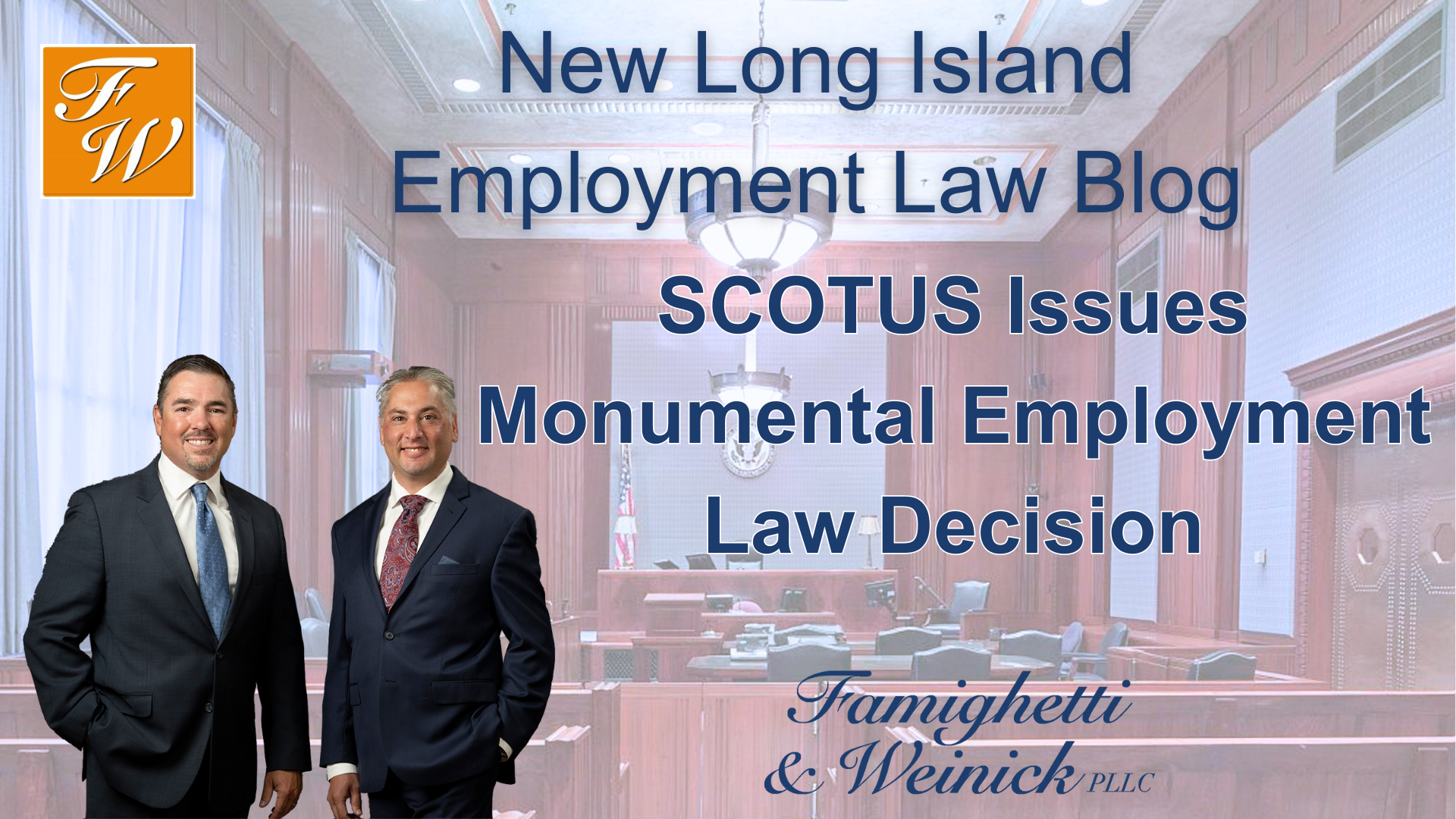- Free Consultation: (631) 352-0050 Tap Here to Call Us
SCOTUS Issues Monumental Employment Law Decision

On April 17, 2024, the Supreme Court of the United States issued a decision in the case Muldrow v. City of St. Louis. The decision is monumental in that it materially alters the requirements that employees must satisfy to prove unlawful workplace discrimination. If you’re thinking that the current conservative leaning SCOTUS ruled in favor of employers, you would be wrong. Read today’s Long Island employment law blog to learn about the Muldrow decision and its impact on employment discrimination cases across the nation.
In Muldrow, the female plaintiff was a plain clothes police officer assigned to a special Intelligence Division. By virtue of this assignment, Muldrow received what could only be reasonably viewed as employment benefits, though not in the traditional sense. Muldrow did not receive extra pay or better health care benefits. Rather, Muldrow received other perks such as FBI credentials and use of an unmarked police car which she could take home.
Eventually a new commander of Muldrow’s unit took over. According to Muldrow’s lawsuit, the new commander made comments suggestive of a sex based animus. For instance, he referred to Muldrow as “Mrs.”, rather than Sergeant, as was customary. Further, according to Muldrow, the commander transferred her out of the unit, in order to replace her with a male officer.
Indeed, the police department transferred Muldrow to a uniformed position in a precinct. Her pay and rank remained the same, but other aspects of her job changed. For example, instead of working alongside high ranking police officials in the Intelligence Unit, she supervised neighborhood patrol officers and performed mundane administrative duties, including reviewing reports and arrest records. Further, she lost her FBI credentials and use of the unmarked car, and instead of working a regular workweek schedule, she worked a rotating schedule which included weekends.
Muldrow alleged that the transfer constituted unlawful employment discrimination based on sex, in violation of Title VII, the federal workplace anti-discrimination statute. In court, however, Muldrow faced an obstacle to proving her case. Across the country, appellate courts have been ruling that to prove a discrimination case, employees must prove that they faced an employment action which was “significant,” “material,” or some other similarly heightened level of harm. To meet this standard, courts have generally required some showing of a change to the employee’s pay, benefits, or other compensation.
Indeed, the trial court dismissed Muldrow’s case, holding that her transfer was not significant because it did not produce a material employment disadvantage. The Eighth Circuit Court of Appeals agreed and held that because Muldrow did not and could not show the transfer caused a diminution to her title, salary, or benefits, she could not prove a discrimination case.
As observed by SCOTUS, courts which have applied the heightened significant harm standard have dismissed employment discrimination cases where an employee was assigned to work at a different job site next to a 14 x 22 foot wind tunnel, where a worker was assigned to a position which requires only nighttime work, and where a school principal was required to accept a position supervising fewer employees in a non-school based administrative role. In other words, SCOTUS was suggesting that these harms should be sufficient to support an employment discrimination case, but that courts improperly dismissed them.
In Muldrow, SCOTUS emphatically rejected this approach, noting explicitly that “this [Muldrow] decision changes the legal standard used in any circuit that has previously required ‘significant’, ‘material,’ or ‘serious injury.'” SCOTUS determined that nowhere in the text of the statute does Congress require that an employee show a harm which is significant. Admonishing courts which applied a showing of significant harm, SCOTUS noted that those courts added words to a law which was passed by Congress, and words which Congress did not include in the statute.
Instead of the significant harm standard, SCOTUS adopted a standard which now requires that employees simply show that they were treated worse because of sex, or because of another protected trait.
In Muldrow’s case, SCOTUS had no problem concluding that, based on the new and proper standard, Muldrow’s transfer was sufficiently disadvantageous to her, constituting worse treatment based on sex. In fact, Justice Kagan, writing for the majority, noted that Muldrow was worse off several times over.
In sum, Muldrow is remarkably important and momentous decision in the world of employment discrimination law. Countless cases have been dismissed over the years because Courts applied an improper heightened significant harm standard. Though those cases cannot now be resurrected, future plaintiffs will have an easier time establishing their employment discrimination claims brought under Title VII.
If you have questions about the Muldrow decision, the harm requirement for an employment discrimination claim, or about employment discrimination in general, please call one of our employment discrimination lawyers. The best number to use to contact us is (631) 352-0050. More information is available on our website. Remember to follow our social media to stay update on future employment law news.








